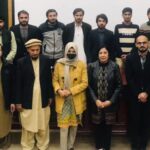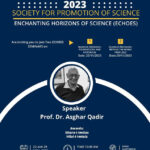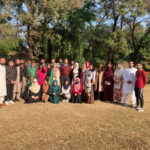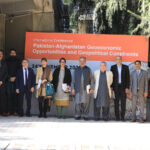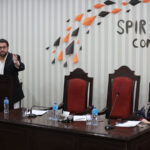International Conference on ‘Migration, Education and Development in South Asia’
Federal Minister for Education Muhammad Baligur-ur-Rehman reaffirmed his support for research focused on problem-solving and to remove disconnect between policy makers, academia and industry as international conference on ‘Migration, Education and Development in South Asia’ started at Quaid-i-Azam University (QAU).
The conference is part of the research project jointly carried out by Quaid-i-Azam University, Islamabad and University of Sussex, supported by British Council and Higher Education Commission (HEC).
Federal Minister said that Migration is a universal phenomenon and every year millions of people move around the world for better economic opportunities. This phenomenon is as old as humanity itself, but the study of human migration as a social and economic phenomenon is of recent origin.
He said with the active involvement of Government and non-government agencies in labor recruitment for different parts of the world, the emigration of the population has became an institutionalized activity and the regular outflow of labor has been accepted as an important element of the national fiscal policy.
He urged the scholars and social scientists who were participating in the conference to deliberate on this issue and come up with some practical suggestions for the policy makers to take suitable measures in future.
Speaking at the occasion, Engr. Imtiaz Hussain Gilani, Chairman HEC briefed the audience about HEC-BC Pakistan “International Strategic Partnerships in Research and Education (INSPIRE)” Programme. He said that academics cannot sit in isolation; they have to adopt more proactive approach and come up with indigenous solutions for indigenous problems and should contribute to the socio-economic uplift of the country.
Addressing the inaugural session QAU Vice Chancellor Prof. Dr. Eatzaz Ahmad said that Migration is such an important issue that no serious social scientist can afford to remain detached from it. He said that Undertaking of the project on migration, education and development in South Asia is a timely decision and it is perhaps one of the most relevant areas in which funds were needed to be invested. Just the volume of remittances from expatriate Pakistanis that run into more than a billion dollars per month would justify several such projects.
He said that different inter-linkages between migration and education need to be analyzed and understood for better understanding and designing a framework for education and migration policies, especially when these dynamics are seen in the perspective of development.
Dr. Hafeez-ur-Rehman, Professor of Anthropology, QAU and coordinator for the project while briefing the audience said that conference on Migration will deal with the links between Migration and Education in order to provide practical insight for policy-makers in the field of Education on how to respond to the consequences of Migration as a means for attaining educational goals, and as a strategy to support future Migration Plans. The key questions include, the extent that remittances are channeled towards supporting and improving educational institutions and resources in development contexts, how migrant children’s education might be affected by their movement between places, and how immigration policy may impact on potential migrants’ education.
Prof. Dr. Johar Ali, Vice Chancellor, University of Malakand, Dr. Abdul Basit, Chancellor Preston University and Prof. Dr. Filippo Osella, Head of Anthropology Department, University of Sussex, Ms. Sarah Parvez, Manager INSPIRE, British Council and Mr Saad Gilani, representative of the ILO also spoke on the event.
 jobs@QAU
jobs@QAU



